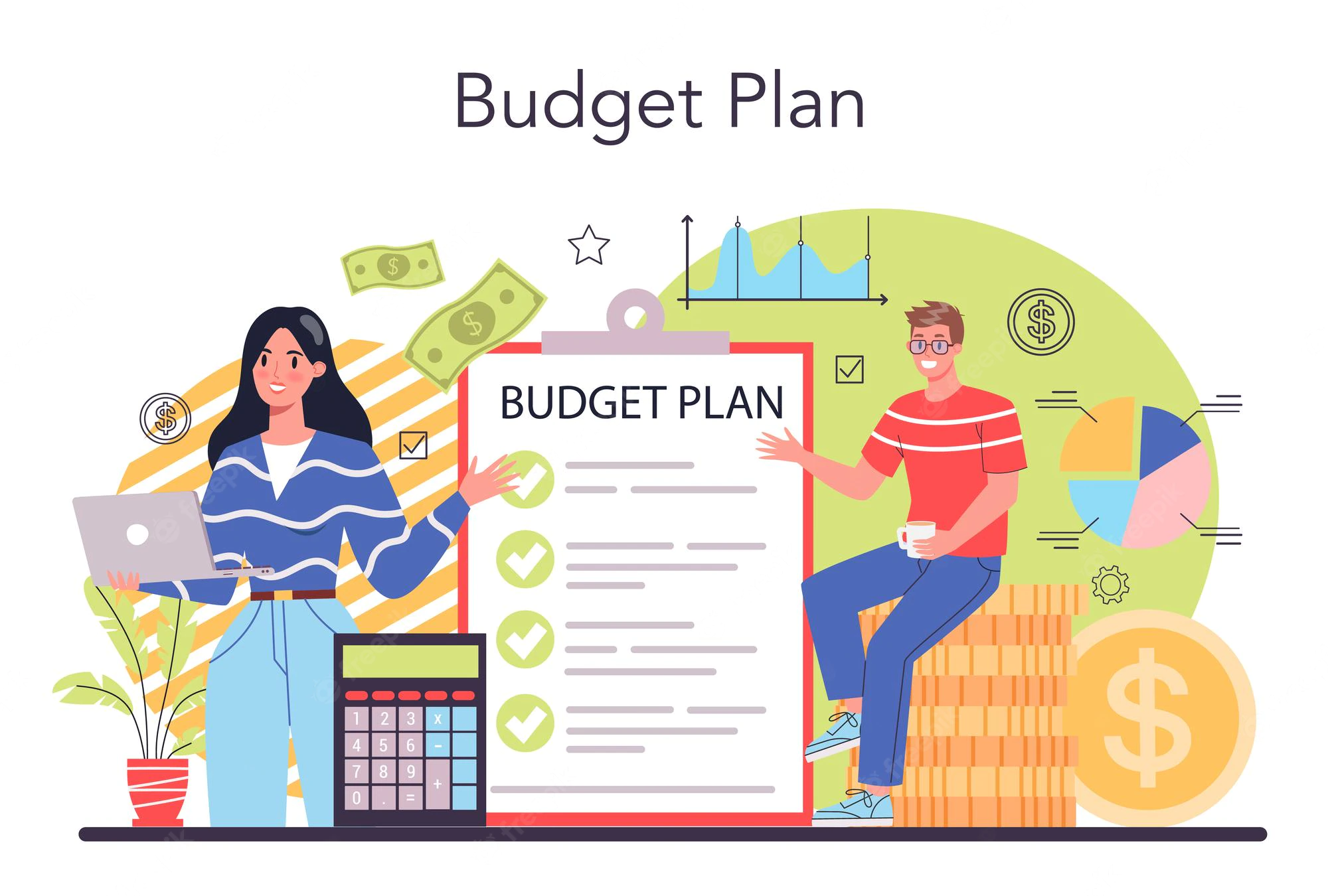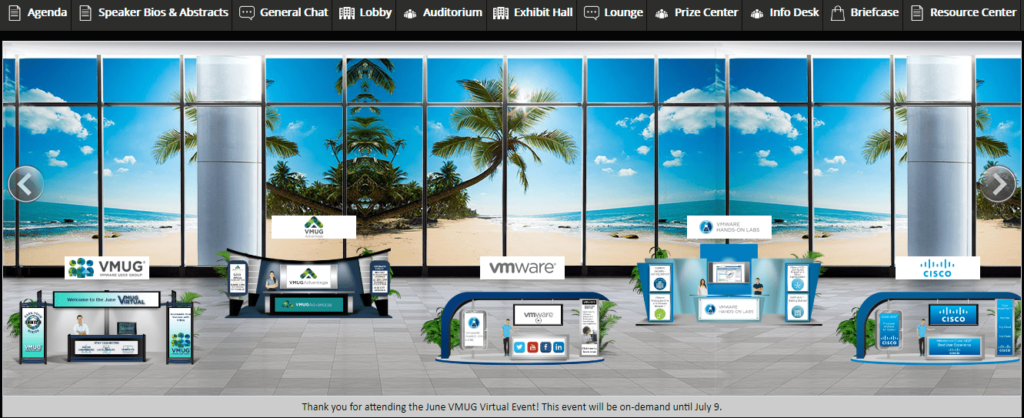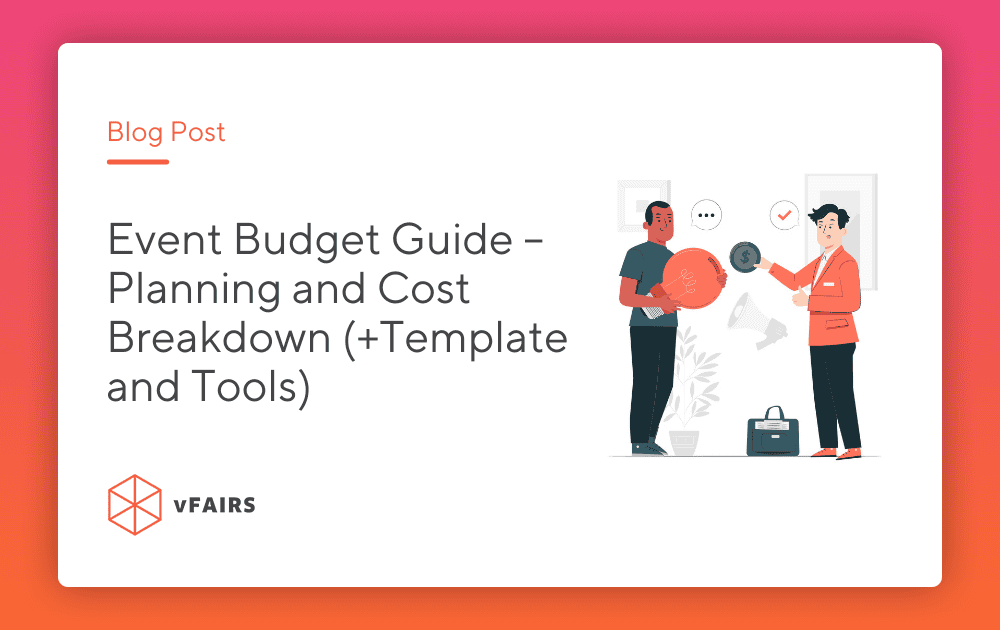Events, be it corporate conferences, fundraisers, or social gatherings, require thorough planning and execution for success. Behind this success lies a well-thought-out event budget that covers expenses and maximizes value for every dollar spent.
This blog will cover all the essential points to remember while creating an event budget. We will break down the event cost for both virtual and physical events to give you a clear idea.
How to Create the Best Event Budgeting Plan
When the question is how to manage an event budget, there are some steps you need to follow to create a budget plan that works.

1. Know Your Event Goals
How do you start making a budget plan for an event? Define your event goals.
The budget for your event should reflect everything you have in mind for it, from the big picture to the decorations, technology, setup, merchandise, and talent.
Getting clear on the goals and priorities of your event will also help you set realistic expectations. Take stock of your goals and objectives before planning the event itself. What are the initial event costs, like vendor deposits? What kind of space do your guests need for your event? Will you make money from selling food, goods, or tickets?
2. List Down Specific Expenses
Now is the time to start looking into the details of each line item in your budget. You should make a good list of the things to include based on what happened in the past and what inspired you. But here are the most important expenses for an event to include in your event planning budget:
On-site Event Costs
- Venue
- Event Staff
- Food and beverage
- Audio/Visual Equipment
- Speakers and entertainment
- Transportation
- Swag and other handouts
- Security
Event Marketing and Promotion
- Graphic design
- Social media and paid advertising
- Printed marketing materials
- Affiliate and influencer fees
- Paid content marketing
Event Management Technology
- Event management platform
- Booking and ticketing fees
- Event website
- Mobile event app
- On-site check-in and registration
- Event Reporting
- Virtual event technology
3. Get Multiple Vendor Quotes
You should get multiple quotes from various companies for all of the above costs. This is the best way to ensure you’re getting a good deal and allows you to negotiate with vendors for a better price.
The other benefit of getting multiple quotes is learning more about how prices vary for each item. You won’t know the price range until you talk to more than one vendor. They can also help you figure out what you need and don’t. They might even know how to save money on a specific line item.
4. Balance Income and Expenses
How much money you think the event will bring in will significantly affect your budget as a whole. You can get cash from selling tickets, getting sponsors, selling goods and services at the event, and coming up with other creative ways to make money.
Ensure to include estimates for all of these sources of income in your event budget proposal. This will help you and others to see how much the event will cost and how much it is expected to make back.
This can also work the other way around. Once you have a good idea of your event costs, you can come up with sponsorship packages or prices for tickets that will cover the total. This gives you a clear goal for how much money you want to make from the event and helps you keep your costs in check.
5. Separate Emergency Event Expenses
Those who have planned events know that there are always chances of errors. You might run out of something on the day of the event and have to rush. Your sound and video equipment might need to be upgraded to suit the venue. Your speakers might have to call in sick. No matter what it is, you need to be ready with a rainy day fund.
How much extra you need will depend on your event’s size and what you’ve planned for if something goes wrong. But as a general rule, you should add 15–30% of your total budget.
6. Use an Event Management Software
Event management can be complex and take a lot of time. Of course, having a professional team to plan the event is the best way, but buying the right software for managing events may also be a good idea if your event is complicated.
vFairs is a leading virtual, hybrid, and in-person event management platform that can help you organize a successful event the way you want to. It also offers a dedicated project management team that stays by your side throughout the process.
What Should a Budget for an Event Include?
Managing your event budget is critical, but what should be included in the budget may not be as evident. For example, when figuring out how much to spend on your venue, you must consider what you want to say and your goals in choosing the right place. Typically, your budget should start with the environment as we move back to live and hybrid events. For instance, if you’re planning an event outside, you must consider the extra costs of outdoor-rated screens and LED walls.
In addition to venues, thinking about your communication, technology, and audience size is essential when making a budget. Let’s take technology as an event budget example. When creating a budget for tech, think about the goals of your meeting and what you need to say to get your point across. This will help you determine exactly what technology is necessary for your event.

Below are a few aspects that you need to understand how to create a budget for an event:
1. Travel & Accommodation
Will your company need to find places for people who are going to the event? If this is true, how much will it cost? Depending on the size and scope of your event, this can be an easy part of your budget to forget. However, you should put this estimate at the top of your budget, so you don’t underestimate how much money you’ll need to make your event a success.
2. Event Venue
Undisputedly you need to dedicate the largest chunk of the event budget to the venue. Your event planner will have to research locations, negotiate rates, and confirm the availability of space for the day(s) you would like to host your event.
Create a budget based on how much you think it will cost. Also, think about any hidden costs that might come up, like those for security, lighting, or heating.
3. Logistics
Do you need special contracts, permits, or insurance to host your event? These things have to do with logistics, which is an integral part of any budget. How well you can guess this cost will mostly depend on where your corporate event will take place.
4. Food
What will the cost of food be? This will depend on how many people you think will come and how extensive the menu will be. Figure out how much it will cost based on how big and what kind of event you are planning.
5. Staff Payments
Include staff pay in your event plan template so that you don’t have financial problems because you didn’t budget well. Directors or managers of an event will have to figure out how many staff members they will need to plan and run a successful event. Find out how much time you will spend and what kind of payment is necessary.
6. Marketing & PR
Promoting an event is an essential part of it. However, it can also take up a big chunk of the budget for your corporate event, especially if the organizers plan to make money from event fees or other charges. Think about the tools you want to use to market your event and choose the ones that fit your budget.
Event Budget Planner Template
Check this all-in-one event budget template Google Sheets to make the best budgeting plan for your next event. This event budget spreadsheet has sections for all types of events so you can manage everything smoothly.
Download the Event Budgeting Planner
Event Cost Breakdown – Virtual & In-Person
How much does it cost to host an event?
Since there are different event budget management considerations for different event formats, we have created a complete breakdown of the event budget for both virtual and in-person events.
Virtual Event Budget Breakdown
The cost of a virtual event can vary based on the extent of features, duration, exhibitor participation, and customizations required to match the organizer’s needs.
Per Event Pricing
On average, institutions hosting virtual events can expect prices for the platform to start around $14,925 for the virtual event platform license to conduct one event. The standard solution set covers the following technology, support, and services:
- Dedicated event manager from start to finish for hands-on assistance and expert advisory
- Customized event landing page and registration form
- Standard 3D lobby, exhibition hall, auditorium, and lounge designs
- 15 unique branded virtual booths for exhibitors
- Technical support for seamless event operations (e.g. prerecording webinars, design customizations, content uploading, etc.)
- Live technical support during the event
- Chat tools
- 15 Webinars/ live sessions
- Post-event analytics and custom event reports
Annual Plans
There are three tiers of annual pricing plans which makes it easier for clients having different event budgets to host an event as per their needs, namely:
- Basic Annual License
- Premium Annual License
- Enterprise Annual License
You can include different add-ons into your package and get custom pricing to host your virtual event.

Organizers must keep their event budget slightly flexible as the cost of a virtual event would vary based on the length, number of users, features in use, customizations, and optional marketing services that some vendors might offer.
The primary event framework for hosts to look forward to is a power-packed bundle of functionalities and personalized digital assets that can ensure the virtual event does not go unnoticed. Further enhancements can always be incorporated at an additional price, such as resume search filters and other advanced recruitment technology.
To get a detailed overview of the event cost breakdown of virtual events, check out our pricing page.
Physical Event Budget Breakdown
As compared to the virtual event budget, physical events have additional costs. To determine the event budget analysis for a physical event, let’s look at some of the key event costs involved and their pricing quotes from vendors. Use this as an event planning event budget sample for your next event:
1. Venue Rental
Even for a mid-sized local recruitment event with an anticipated audience of 300, when venue pricing is calculated based on the industry average of $0.14 per gross square foot per day, the rental cost incurred will be approximately $8,400 for a 60,000 sq ft hall for one day.
2. Car Parking
Arranging a parking lot to prioritize guest convenience is critical. Rental rates can range anywhere between $1,000 to $1,500 based on medium-to-large capacities.
3. Event Marketing
To get all eyes and ears focused on your upcoming event, branding and running a marketing campaign are critical. Design, PR, strategy, and reporting services from an established agency can add about $5,500/month to the in-person event budget.
4. Audio and Visual Equipment Rental
Stage setup, equipment for keynote speeches, professional quality lighting rigs, projectors, audio/video equipment, and technical assistance all come at a price. From assembling to delivery, on-site technical assistance and AV equipment rental rates for an 8-hour event will be an estimated $1,000 at the bare minimum.
5. On-Site Technology
Here are some event costs for on-site technology you need to consider when you manage event budgets:
- For online registration and ticketing of your online event, you will need a custom landing age, registration form, pre-event email marketing, and attendee management which costs around $4,950 per event.
- The payment pages and payment integration for PayPal and Stripe cost almost $2,950 per event.
- Then comes the check-in gear that includes a badge printing app ($1,950), a tablet with a stand ($200), and a laptop ($240).
- For badge printing, you will need a high-speed printer ($350), a WiFi router ($300), an ethernet switch ($60), and a 4G data package ($125). The badges and lanyards cost around $5 each and for a 300-attendee event that costs around $1500.
- An all-in-one event mobile app costs $8,925 for 3 live day events.
Without any add-ons, onsite technology adds up to around $21,550 to the event budget.

5. Insurance
It’s always better to be overprepared than under when it comes to budgeting for an event. To avoid unwanted stress, hosts can get insurance for a medium-sized event at a starting price tag of about $150.
6. Hospitality
Keeping recruiters and staff energized during the event visibly improves the job seeker experience. Arranging on-site corporate catering even for a conservative group of 60 members (breakfast, afternoon snack, and lunch included) can run the organizer a hefty bill of up to $70 per person which is $4,200 in total.
7. Staffing
The standard rule of staffing is providing at least 1 assistant for every 12 guests. To spearhead the smooth running of operations for an 8-hour event with an audience of 300, you will require at least a team of 25. Rates estimated on ThumbTack start at $20, leading to a hike in event expenses of $4,000.
8. Event Planner and Manager
Event planners can charge on an hourly basis, or a flat fee based on the scale of the event. To bring an experienced event manager on board, you will have to dedicate an estimated 15%-20% of the total event budget to this role. The total funds required for the event based on the above-mentioned estimates is around $24,100. So an extra 15% of $24,100 = $3,615.
Physical Event Budget Summary
- Venue Rental: $8,400;
- Parking: $1,000;
- Marketing: $5,500;
- Technology Assets/Audio and Visual Equipment Rental: $1,000;
- On-Site Technology: $21,550;
- Insurance: $150;
- Hospitality: $4,200;
- Staffing: $4,000;
- Event Planner and Manager: $3,615
The total event budget for a physical event may start at $49,275.
Conclusion
Planning a budget for an event of any size is difficult. However, as an event organizer, you must keep costs in check to ensure that the event generates the most revenue. An event budget varies depending on the extent of branding, marketing collateral, giveaways, and staff travel arrangements. But, the effort and time that goes into event management is uncanny.
An event budgeting template can help organizers ensure alignment with financial objectives. To streamline the process, they can collaborate with an event tech provider offering a built-in budgeting tracker. The vFairs event budgeting module can be a helpful tool to simplify budget tracking.





